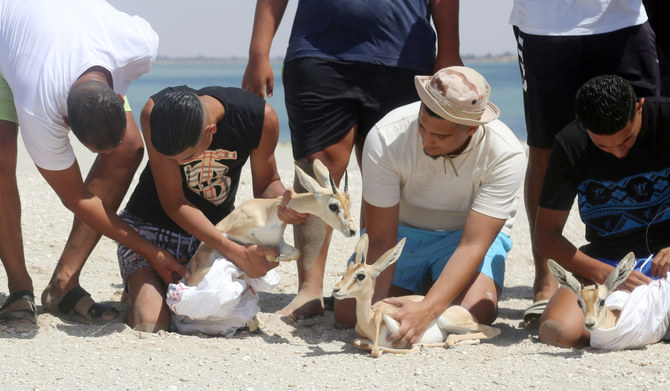FARWA: Cocooned in white bags and nestled in the arms of volunteers, eight young rhim gazelles — an endangered species native to North Africa — have been transferred to an uninhabited Libyan island.
Environmentalist hope their new home on Farwa Island, near Tunisia, will be a haven for the vulnerable animals.
Also known as Gazella leptoceros or simply rhim, the slender-horned gazelle lives in desert areas in Algeria, Tunisia, Libya, and Egypt.
However, its population has declined significantly as it is a prized target for hunters.
According to an International Union for Conservation of Nature, or IUCN, assessment in 2016, there were only between 300 to 600 mature rhims in the North African wild. Environmentalists “wanted to relocate the wild animals in Farwa,” a 13-km-long sandbar, as part of the gazelles’ conservation efforts, said Mohammed Al-Rabti, one of the volunteers. Rabti added that the first group of rhims was released a few weeks ago, “followed by eight individuals, including one male and seven females,” on July 18.
BACKGROUND
Activists have long warned that coastal erosion and rising water levels are among the Farwa island’s climate-driven threats.
The young gazelles took off frolicking as soon as they were released before promptly disappearing behind the island’s wild bushes.
The animal with long, slender horns is small, nimble, and well-adapted to desert life.
It has a pale coat that enables better survival by blending into sandy landscapes.
The coloring is less effective against hunters, which for a while have been the gazelles’ major predators.
Equipped with binoculars, automatic rifles, and powerful four-wheel drive vehicles, some go after the animals merely as a hobby.
Others hunt them for a price going as high as 5,000 Libyan dinars ($1,000) per carcass.
Gazella leptoceros has been classified in the IUCN’s “Red List of Threatened Species” since 2016.
With no official census from Libya, little has been done to preserve their lives.
However, that could be set to change with the work of numerous NGOs and activists.
Farwa, though not their natural habitat, seems to have suited the first group of gazelles released on the island, said Youssef Gandouz, an environmental activist.
They have been “monitored with binoculars and drones and are doing very well,” said Gandouz.
The island is also home to the loggerhead sea turtle (Caretta caretta), which has become its symbol and is a staging post for flamingos and other migratory birds traveling over Africa to rest before flying across the Mediterranean to Europe.
While it remains uninhabited today, Farwa was once home to Amazigh tribes before they left for neighboring areas inland.
The island appears picture-postcard idyllic, with scattered date palms on white sandy beaches and ringed by the sparkling Mediterranean.
Slain Libyan leader Muammar Qaddafi dreamed of building a luxury seaside resort with “floating” villas and a golf course.
Once famed for its exceptional wildlife, it faces many threats today, including illegal fishing and pollution.
“Many associations and universities ... are making significant efforts to protect the biodiversity and plant cover” of Farwa, said Jamal Ftess, a reserve manager for the island.
Besides wildlife, environmentalists have also been working to preserve the island’s scarce flora.
Local associations like Bessida have been planting vegetation resistant to wind and sea sprays requiring little water. They say this can help provide animal food and protect against erosion.
Gandouz, helping volunteers to move some of the plants, said it was the second transplantation effort on Farwa.
“The vegetation on Farwa is sufficient” for the survival of rhim gazelles, said Ftess, and Gandouz added the narrow island “is now a haven where turtles and migratory birds can nest and feed.”
But activists have long warned that coastal erosion and rising water levels are among the island’s climate-driven threats.
Ftess said a study conducted by a Libyan university found that “between 1961 and 2006, Farwa’s coastline lost 1.6 meters per year, and between 2006 and 2020, erosion reached two meters per year.”
“We need the help of the authorities to preserve it,” he said.
























